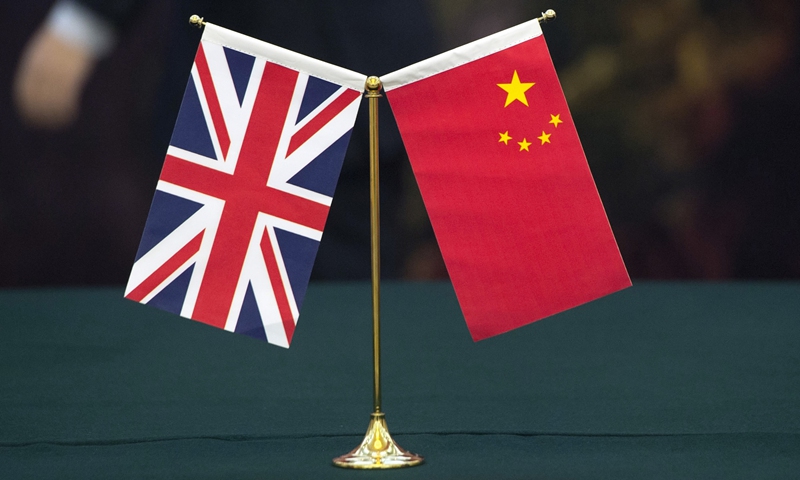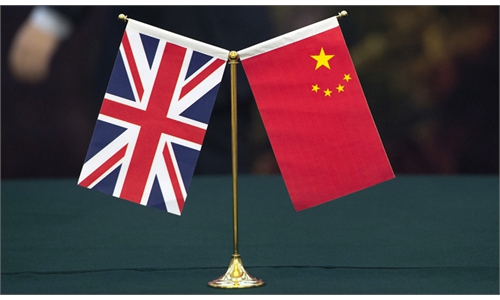UK urged not to cater to US with new defense review reportedly to mention Taiwan question, take tougher statements against mainland

China UK Photo:VCG
A new comprehensive review of UK's security, defense and foreign policy will mention the Taiwan island and hype the “China threat,” according to UK media, which an expert believes would be a tougher approach to China that the UK takes to cater to US’ strategic goals and enhance its relationship with the US.
The updated Government's Integrated Review of Security, Defense, Development and Foreign Policy by UK Prime Minister Rishi Sunak, which is to be published on March 13, will attempt to find a balance between taking a tougher approach to China while maintaining cooperation with China in certain areas, The Telegraph reported.
The Integrated Review published in March 2021 confirmed UK's foreign and defense priorities for the next decade and the former Prime Minister Liz Truss promised a refresh of the document and vowed to declare China a threat to national security and toughen the country's policy toward China, with Sunak deciding to continue with the revamp when he took over as prime minister.
Meanwhile, the original Integrated Review did not include a reference to the Taiwan question.
The Telegraph understands that the UK government will revise the document to include the Taiwan question. It is understood that the review will set out a more robust approach to counter the so-called threats posed by Beijing.
However, the document will not recommend that diplomatic channels with China should be entirely cut off.
According to The Telegraph, the review is still likely to disappoint China hawks on the Tory backbenches who want the government to redesignate China as a “threat.”
Sunak will fly to San Diego on Sunday to unveil plans for supplying Australia with nuclear-powered submarines under the AUKUS scheme amid concerns about the growing threat from China. A major announcement 18 months in the making is expected when the UK prime minister meets his Australian counterpart Anthony Albanese and US President Joe Biden.
In September 2021, the US, the UK and Australia announced the establishment of the AUKUS security partnership, promising that the US and the UK would help the Australian Navy establish a nuclear-powered submarine force and build eight nuclear-powered submarines.
Plans by the US and the UK to provide Australia with nuclear-powered submarines have also sparked speculations that in the event of a conflict across the Taiwan Straits, the Australian Navy might intervene together with the US military.
Commenting on the updates, Mao Ning, a spokesperson for the Chinese Foreign Ministry, said at a press conference on Thursday that China has made clear its strong position on nuclear submarine cooperation between the US, the UK and Australia on multiple occasions.
“We urge the US, the UK and Australia to abandon the Cold War mentality and zero-sum games, honor international obligations in good faith and do more things that are conducive to regional peace and stability,” Mao said.
Cui Hongjian, director of the Department of European Studies at the China Institute of International Studies, told the Global Times on Sunday that striking a balance between political toughness and economic cooperation is a fundamental characteristic of UK’s policy toward China.
According to Cui, from the late Johnson administration to the Truss administration, with the COVID-19 pandemic and the Ukraine crisis occurring successively, the unbalanced trend of UK's policy toward China intensified. However, generally speaking, UK’s policy toward China has returned to a balanced approach since Sunak took office.
Cui said that in terms of UK's position on the Taiwan question, the zero-sum games between China and the US are a basic background and major consideration for many European countries, including the UK, when formulating their foreign security and foreign policies.
“The UK’s tougher statements on the Taiwan question in the upcoming defense report will cater to the so-called strategic goals of the US and upgrading the so-called special relationship between the UK and the US,” Cui said.
Moreover, the UK is also seeking to woo some Asia-Pacific countries, such as Australia, to gain a foothold in this region, thus, it will play up the “China factor” constantly to gain the “legitimacy” to enter the region, Cui added.

